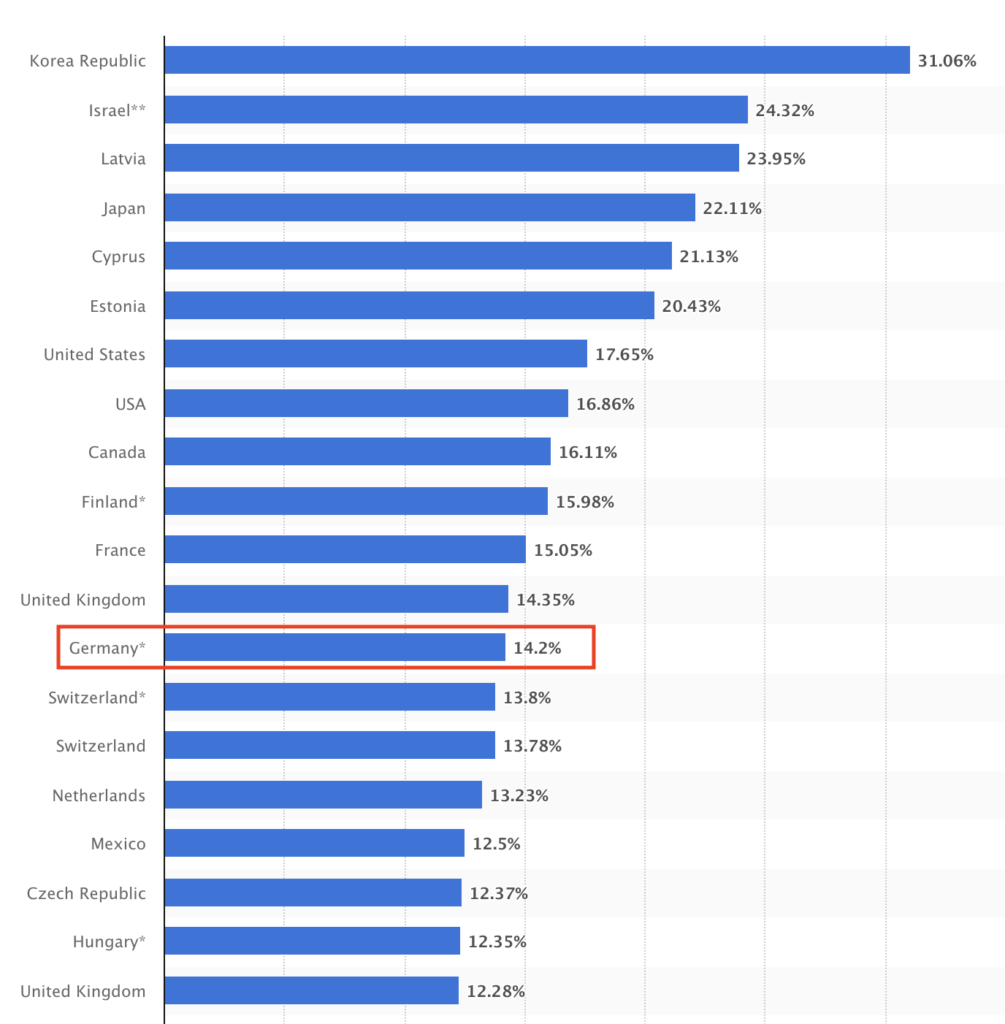Image: Canva
The Challenge of the Gender Pay Gap in Germany
Equal Pay Day is a significant occasion to draw attention to the existing gender pay gap in Germany. This day symbolically marks how many extra days women must work in the new year to earn the average annual salary of men. Despite long-standing efforts for equality, there remains a significant disparity in wages between genders.
The Gender Pay Gap in Germany: Statistics
According to current statistics from Statista, the gender pay gap in Germany in 2024 is approximately 14.2 percent. On average, women earn around 86 cents for every euro earned by their male counterparts. This inequality has serious implications for women’s economic security, retirement savings, and career development opportunities.
Causes of the Gender Pay Gap and Challenges
The reasons for the gender pay gap in Germany are diverse. Occupational segregation plays a crucial role, with women more likely to work in industries and positions with lower salaries. Traditional gender roles and unequal distribution of family and caregiving responsibilities also contribute to wage disparities. Additionally, workplace discrimination and unconscious biases play a role.
Measures to Reduce the Gender Pay Gap and Government Initiatives
The German government has implemented various measures to reduce the gender pay gap. These include the Pay Transparency Act and the promotion of women in leadership positions. However, there is still much to be done to achieve genuine wage equality.
Recommendations for Action and Engagement for Wage Equality
Equal Pay Day provides an opportunity to raise awareness of the importance of wage equality and to take collective action to overcome this challenge. By advocating for fairness and equality in the workplace, we can create a society where women and men have equal opportunities to thrive professionally and be fairly compensated.






 English
English Deutsch
Deutsch Українська
Українська Polski
Polski עִבְרִית
עִבְרִית Türkçe
Türkçe العربية
العربية Français
Français Italiano
Italiano Español
Español 繁體中文
繁體中文 简体中文
简体中文 Shqip
Shqip Bosanski
Bosanski Български
Български Hrvatski
Hrvatski Čeština
Čeština Nederlands
Nederlands Suomi
Suomi Српски језик
Српски језик Ελληνικά
Ελληνικά Русский
Русский Română
Română Português
Português فارسی
فارسی ਪੰਜਾਬੀ
ਪੰਜਾਬੀ Svenska
Svenska Afrikaans
Afrikaans አማርኛ
አማርኛ Հայերեն
Հայերեն Azərbaycan dili
Azərbaycan dili Euskara
Euskara Беларуская мова
Беларуская мова বাংলা
বাংলা Català
Català Cebuano
Cebuano Chichewa
Chichewa Corsu
Corsu Dansk
Dansk Esperanto
Esperanto Eesti
Eesti Filipino
Filipino Frysk
Frysk Galego
Galego ქართული
ქართული ગુજરાતી
ગુજરાતી Kreyol ayisyen
Kreyol ayisyen Harshen Hausa
Harshen Hausa Ōlelo Hawaiʻi
Ōlelo Hawaiʻi हिन्दी
हिन्दी Hmong
Hmong Magyar
Magyar Íslenska
Íslenska Igbo
Igbo Bahasa Indonesia
Bahasa Indonesia Gaeilge
Gaeilge 日本語
日本語 Basa Jawa
Basa Jawa ಕನ್ನಡ
ಕನ್ನಡ Қазақ тілі
Қазақ тілі ភាសាខ្មែរ
ភាសាខ្មែរ 한국어
한국어 كوردی
كوردی Кыргызча
Кыргызча ພາສາລາວ
ພາສາລາວ Latin
Latin Latviešu valoda
Latviešu valoda Lietuvių kalba
Lietuvių kalba Lëtzebuergesch
Lëtzebuergesch Македонски јазик
Македонски јазик Malagasy
Malagasy Bahasa Melayu
Bahasa Melayu മലയാളം
മലയാളം Maltese
Maltese Te Reo Māori
Te Reo Māori मराठी
मराठी Монгол
Монгол ဗမာစာ
ဗမာစာ नेपाली
नेपाली Norsk bokmål
Norsk bokmål پښتو
پښتو Samoan
Samoan Gàidhlig
Gàidhlig Sesotho
Sesotho Shona
Shona سنڌي
سنڌي සිංහල
සිංහල Slovenčina
Slovenčina Slovenščina
Slovenščina Afsoomaali
Afsoomaali Basa Sunda
Basa Sunda Kiswahili
Kiswahili Тоҷикӣ
Тоҷикӣ தமிழ்
தமிழ் తెలుగు
తెలుగు ไทย
ไทย اردو
اردو O‘zbekcha
O‘zbekcha Tiếng Việt
Tiếng Việt Cymraeg
Cymraeg isiXhosa
isiXhosa יידיש
יידיש Yorùbá
Yorùbá Zulu
Zulu